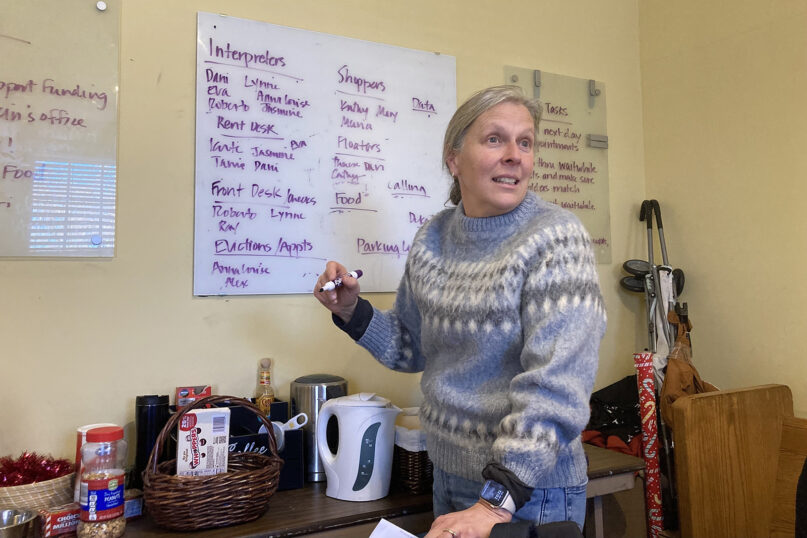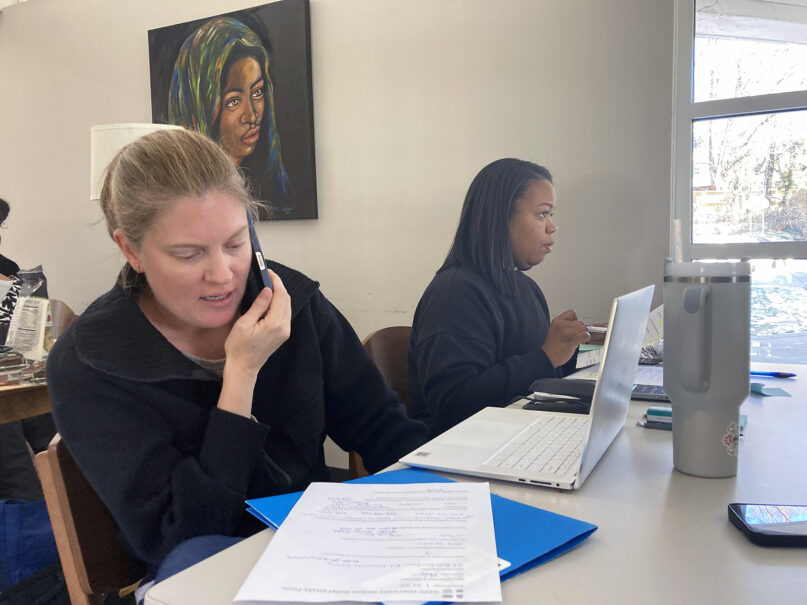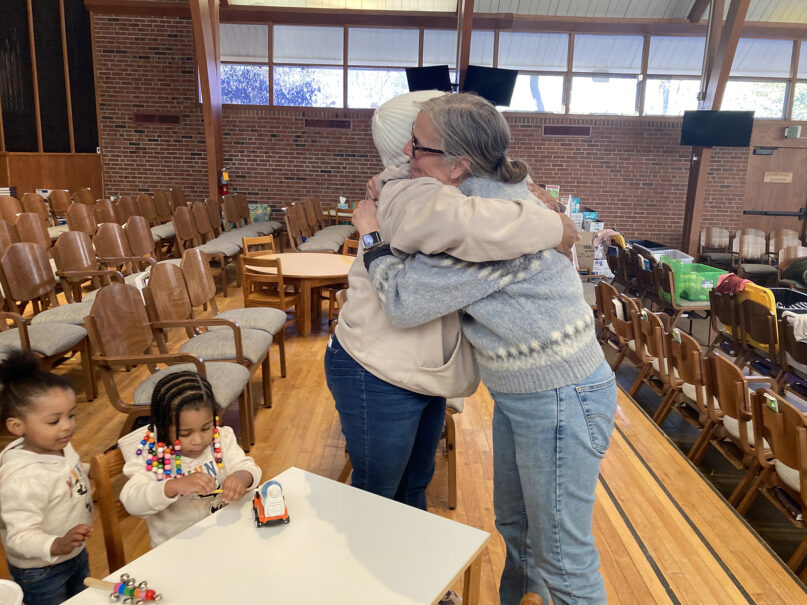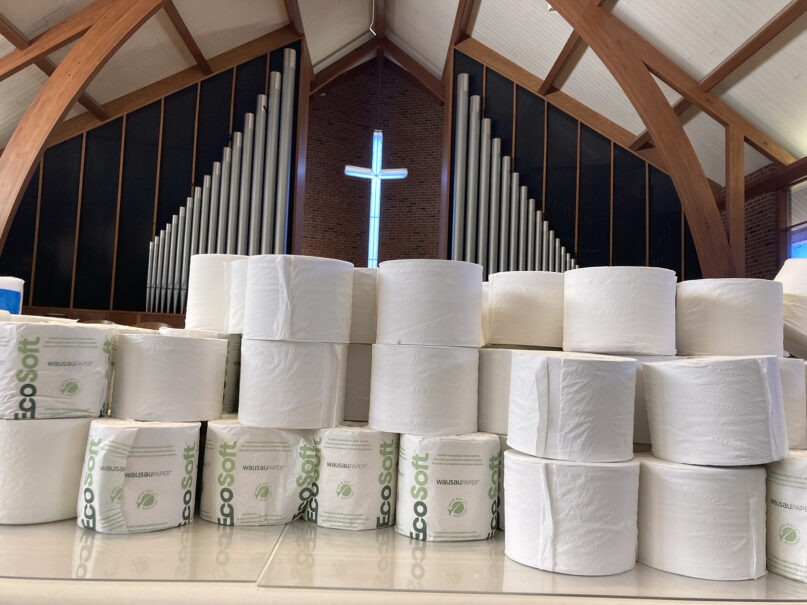ASHEVILLE, N.C. (RNS) — On a recent Tuesday morning, dozens of people affected by Hurricane Helene had already lined up outside the glass doors of Grace Covenant Presbyterian Church. Inside, volunteers were squeezed into a small business office, some seated on the floor, listening as the church’s pastor, the Rev. Marcia Mount Shoop, gave them instructions for the day.
On a whiteboard she asked their help to match tasks with names: Who would process applications for rent and utilities? Who would interpret from Spanish? Who would attend to the parking lot? Who would welcome visitors at the reception hall? Who would help them shop for food and toiletries?
With tasks assigned, she was ready to send her troops into the field.
“OK, are we ready to ask the universe for some assistance?” Mount Shoop, 55, called out. “First, I want you to just stomp your feet a little bit. Get yourself grounded. Feel that vibration — a community on the move, doing the work.”
Then she launched into a short prayer: “God, help us trust you and your promise that the truth will set us free. We trust you with everything we do here today — with every conversation, with every check, with every item that is shared, with every moment that somehow, some way, in your creativity and your poetry, it will serve your highest good.”
Last September, Helene, one of the most ferocious storms ever to hit North Carolina, including Asheville, its westernmost city, dumped a foot of rain, causing mudslides, raging rivers and catastrophic flooding. Hundreds lost their homes. Roads and bridges were washed away. At least 100 people died in Asheville and the surrounding towns.

The Rev. Marcia Mount Shoop, pastor of Grace Covenant Presbyterian Church in Asheville, N.C., has led her congregation’s efforts to assist those who lost their jobs after Hurricane Helene with rent support. The church has distributed more than $3.5 million to needy families in Asheville and its surrounding county. (RNS photo/Yonat Shimron)
Along with federal and state agencies, big, national, faith-based relief organizations swooped in. The Church of Jesus Christ of Latter-day Saints dispatched hundreds of volunteers to clear debris and remove downed trees. Samaritan’s Purse, the aid organization headed by Franklin Graham, delivered tons of relief supplies and replaced more than 50 mobile homes. World Vision, another evangelical Christian group, sent truckloads of water, muck-out kits and generators.
Amid those heavy hitters, one midsize church in Asheville has met the moment in a big way. The Sunday after the storm, Grace Covenant Presbyterian, a liberal, mostly white congregation of 730, found its calling, offering rent support to hundreds of people who had lost their jobs after damaged buildings or lack of electricity and water forced their business to close.
The Federal Emergency Management Agency, or FEMA, provides hotel stays for up to 180 days for people whose homes were destroyed or left unlivable — until March 27 for Helene’s victims. In addition, the state provided enhanced unemployment insurance. But for many coming to Grace Covenant, that wasn’t enough. Having lost their livelihoods after the storm, many fell behind on their ability to pay Asheville’s pricey rents. That’s where Grace Covenant has aimed its help.
In less than four months, Grace Covenant has doled out $3.5 million in rent assistance and about $500,000 in electricity payments, serving hundreds of residents. It has also turned its sanctuary into a storehouse where anyone can fill a folding wagon with canned food, diapers and toilet paper.
RELATED: In Helene’s and Milton’s wake, faith-based disaster relief groups prepare for the long haul
Some of the funds came from the city, which granted Grace Covenant $450,000 left over from a housing project that never materialized. The church has also received $300,000 from Buncombe County, as well as several grants from Community Foundation of Western North Carolina and various United Way chapters. The bulk of the funds, however, have come from private individuals impressed with the church’s commitment and flexibility in helping the needy.

Residents seeking assistance wait to be helped at Grace Covenant Presbyterian Church in Asheville, N.C., on Jan. 14, 2025. (RNS photo/Yonat Shimron)
“We saw a massive national response from faith-based organizations,” said Asheville Mayor Esther Manheimer. “But what Grace Covenant is doing and continues to do is, is one of the bigger, more robust examples of a local faith-based organization stepping up in a time of crisis.”
Still, the as the need for its rent support program has outpaced resources, the program may have to scale back from three days a week to two, unless it is able to secure more funding, which Mount Shoop is working feverishly to find.
A 57-year-old nurse’s aide who asked that her name not be used was one of the dozens who lined up for rent assistance last week. She worked in a group home that had suffered extensive damage in the storm. When the residents were moved to other facilities, she lost her job. A few days before, she had landed another job but she still could not make this month’s $1,800 rent on her condo, which she shares with her 5-year-old granddaughter.
“I have always paid my rent on time,” she sheepishly told Kate Shem, an elder at Grace Covenant who has been volunteering.

Kate Shem, left, and Jasmine Moore verify requests for rent support at Grace Covenant Presbyterian Church in Asheville, N.C., on Jan. 14, 2025. (RNS photo/Yonat Shimron)
Shem verified the woman’s residence on her laptop, picked up her phone and called the woman’s landlord to ask how much she owed in rent. After consulting with Mount Shoop, Shem returned to tell the woman she had good news. The church would pay her back rent. Could she come by the next week to pick up a check made out to her landlord?
“Churches and other faith communities can play a really pivotal role in the aftermath of disasters because we have the flexibility in creating our infrastructure,” said Shem, who has a master’s in public administration. “We’re able to help folks much faster. You have to be nimble and flexible in times of crisis.”
The initiative began two days after the hurricane hit. Mount Shoop and her members had already agreed that the church could serve as a relief site, without knowing exactly what that would mean. Communication was still impossible, as cell service was down.
“I was at the church and my phone worked for a minute, and I got word from a former parishioner in a church I served in Chicago, that he had sent a $50,000 gift,” Mount Shoop said. “At the time, I thought, $50,000! Wow! We can do a lot with that. That was the catalyst that made me say to the volunteers, ‘Just tell people whatever issue they have, tell us about it, and we’ll try to meet it.’”
Rent support emerged as the top need. In those first weeks, the church opened its doors every day. As more gifts came in, it was able to dole out a minimum of $100,000 a day to landlords. The church does not pay late fees but negotiates with landlords to forgo them.

The Rev. Marcia Mount Shoop, right, hugs an Asheville resident who came in to pick up supplies with her two children on Jan. 14, 2025. (RNS photo/Yonat Shimron)
Most of the first to receive rent support from the church were Spanish speakers, and the church made sure it had translators on hand. “This is about reciprocity,” said Mount Shoop. “It’s about redistributing wealth and creating the architecture for this to not be an utter financial ruin for our Black and brown neighbors, the people that don’t have as much of a safety net when something like this happens.”
Four months after the storm, the congregation is leaning heavily on faith. It’s impossible to know what grant or benefactor might step in to allow it to continue the work from week to week.
Meanwhile, Sunday services in the sanctuary take place amid tables piled high with toilet paper, diapers or bags of cat litter and canned goods. (The pews were removed two years ago, making the space multipurpose.)
The church is already beginning to form a longer-term vision of building hurricane replacement housing on its land. The idea is for an equity model where tenants pay rent but are able to take some of it with them when they leave.

A table laden with rolls of toilet paper in the sanctuary of Grace Covenant Presbyterian Church where residents can come and pick up supplies. (RNS photo/Yonat Shimron)
“It’s important to those of us now coming to church that we continue this,” said Cathy Froehlich, a longtime church member who has overseen the relief distribution. “We don’t know what that looks like right now, but we definitely want to continue to help our community. We’re giving hours and hours of helping people. And that’s just a different feeling for me. That’s a good feeling for me. I go home at night tired. But I feel blessed to have been a part of this.”
RELATED: After Hurricane Helene, faith groups ramp up disaster relief















